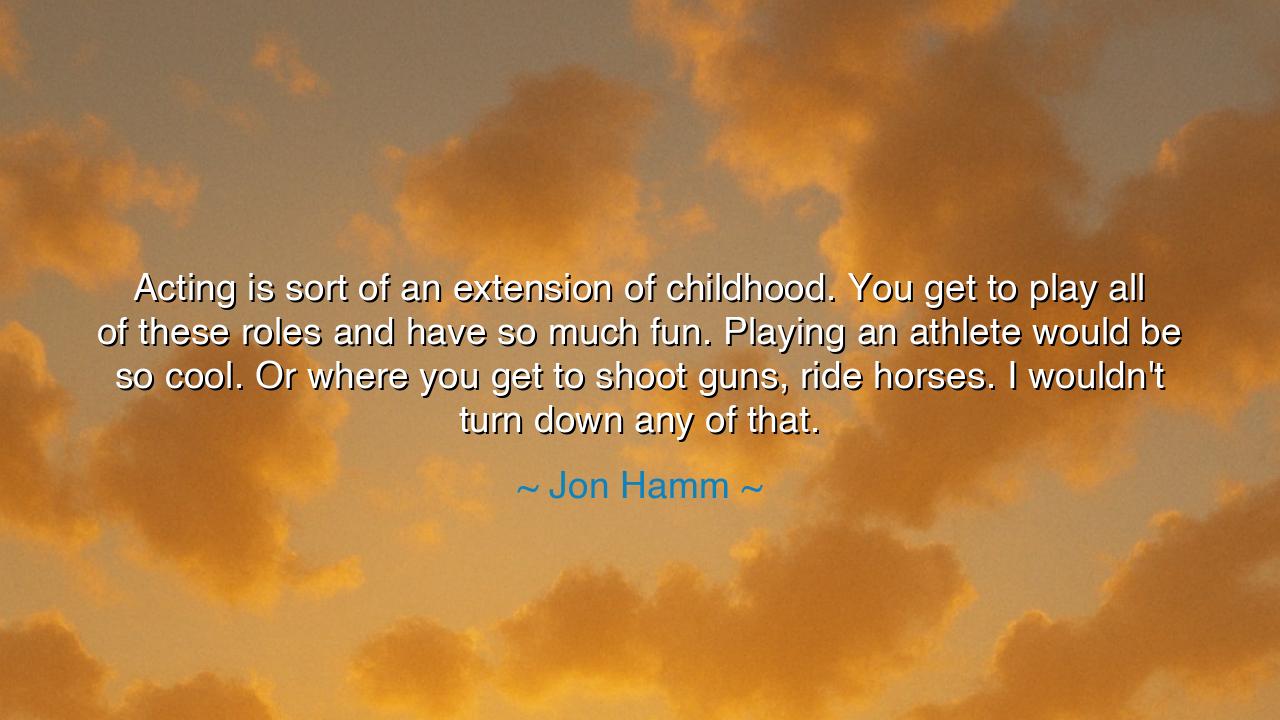
Acting is sort of an extension of childhood. You get to play all
Acting is sort of an extension of childhood. You get to play all of these roles and have so much fun. Playing an athlete would be so cool. Or where you get to shoot guns, ride horses. I wouldn't turn down any of that.






"Acting is sort of an extension of childhood. You get to play all of these roles and have so much fun. Playing an athlete would be so cool. Or where you get to shoot guns, ride horses. I wouldn't turn down any of that." These words from Jon Hamm speak to the profound joy that lies in the freedom and creativity of acting. To Hamm, the art of acting is not just a career but an opportunity to revisit the boundless imagination of childhood, where one can explore limitless possibilities and inhabit various roles that stir the spirit. The thrill of taking on different characters—whether an athlete, a soldier, or a hero—allows the actor to experience life from many perspectives, to play in a way that is often impossible in the structured world of adulthood.
In the ancient world, the concept of play and role was closely tied to the idea of performance and learning. Greek drama, for example, was not merely entertainment but a way to explore deep moral, spiritual, and societal questions. The actor was not just someone performing in front of an audience; they were a channel for the gods, a representative of humanity's deeper struggles. Sophocles, through his tragedies, and Aristophanes, through his comedies, invited their audiences to reflect on life’s complexities by watching actors take on the roles of gods, kings, slaves, and warriors. The actors, like Hamm, were playing different parts, yet these parts allowed the audience to reflect on the human condition.
The Romans too understood the power of performance. Gladiators, though not actors in the traditional sense, played a vital role in Roman entertainment. They performed in the Colosseum, facing perilous combat as a way of representing the struggles of life, the power of fate, and the human desire for glory. But even beyond the arena, Roman theater was an important avenue for social and political commentary, where actors used masks to take on various roles and challenge the norms of society. Just like Hamm’s excitement about playing different characters, the ancient Romans recognized that role-playing—whether on the stage or in life—was a way to explore both personal and societal truths.
In more recent history, Shakespearean actors carried forward this tradition of deep engagement with character and role. Shakespeare, in his brilliant plays, gave actors the opportunity to inhabit some of the most famous and complex characters in history—Macbeth, Hamlet, King Lear—each one a distinct role that required the actor to understand human nature at its most profound and tragic. The actor’s task was to bring life to these roles, to make them real and resonate with the audience’s own human experience. Just as Hamm finds joy in play, so did the actors of the past, for in stepping into a new role, they could not only entertain but also educate, offering insights into the very soul of humanity.
Similarly, actors like Marlon Brando in the mid-20th century revolutionized acting by bringing an intense emotional depth to the roles they played. Brando’s portrayal of Stanley Kowalski in A Streetcar Named Desire changed the landscape of acting, introducing a more realistic, raw style of performance. For Brando, acting became not just about portraying a character, but about becoming that character. His dedication to the roles he played mirrored Hamm’s excitement; acting wasn’t just an occupation but an opportunity to explore, experience, and live in the shoes of someone else, to truly embody a new identity.
The lesson in Hamm’s words is clear: creativity, freedom, and imagination are essential to the human spirit. Just as Hamm finds joy in the playful aspect of acting, we too must find joy in exploring different aspects of our own lives and personalities. The act of “playing”—whether through art, literature, or simply embracing new roles in our lives—allows us to stretch beyond the limitations of our current circumstances and explore new ways of thinking, being, and understanding the world. Life is an ever-changing performance, and we must engage with it as such.
In practical terms, this means that we must embrace new roles in our own lives, whether that means exploring different career paths, learning new skills, or simply taking on a different perspective. Just as Hamm is eager to step into different roles, we too should find the courage to experiment with new identities and new ways of being. Life is full of possibilities, and we must not let the constraints of daily life limit our potential to grow and learn. So, like an actor preparing for a new role, let us prepare to face the challenges ahead with a spirit of adventure, knowing that each new experience offers us the chance to discover a deeper, richer version of ourselves. Just as Hamm enjoys the thrill of acting, let us also embrace the joy of becoming who we are meant to be.






AAdministratorAdministrator
Welcome, honored guests. Please leave a comment, we will respond soon